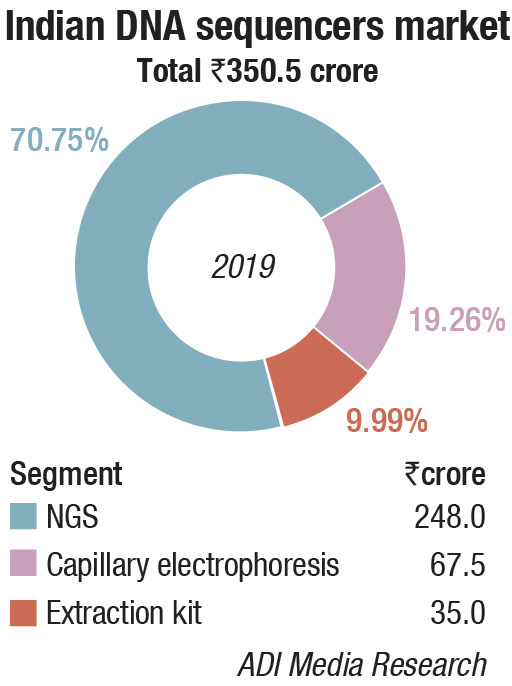DNA Sequencers
42 years of advancements
Due to the continuous development of DNA sequencing technology and understanding of the genome, a comparatively novel scientific discipline as genomics has been established.
 The evolution of DNA sequencing from the nascent protocols to today’s high-throughput technologies has occurred at a breathtaking pace. DNA sequencing now commemorates its 42th anniversary, a period in which it has witnessed multiple technological revolutions and a growth in scale from a few kilobases to the first human genome, and now to millions of human and a myriad of other genomes.
The evolution of DNA sequencing from the nascent protocols to today’s high-throughput technologies has occurred at a breathtaking pace. DNA sequencing now commemorates its 42th anniversary, a period in which it has witnessed multiple technological revolutions and a growth in scale from a few kilobases to the first human genome, and now to millions of human and a myriad of other genomes.
Study of DNA forms the basis of genetic engineering and analysis. The demand within the global DNA sequencing market is set to increase alongside advancements in genetic sciences. The presence of a seamless sector for biological research has created new avenues for market expansion. Demand for accurate, inexpensive, and fast DNA sequencing data has led to the evolution and dominance of a new generation of sequencing technologies. In addition, different sciences are receiving benefits of this technique, including forensic sciences, molecular biology, biotechnology, genetics, anthropology, and archaeology. DNA sequencers are expected to revolutionize the conceptual foundation of these fields.
Researchers are now using innovative technologies for genome mapping that take lesser time for completion. Other than this, the reduction in sequencing costs has led many companies to invest in R&D activities, and offer cost-effective solutions such as whole genome sequencing, de novo sequencing, and specific disease diagnosis. The demand for DNA sequencers has increased significantly with surge in sequencing applications and rise in technological advancements in DNA sequencing. In addition, surge in the number of genome-mapping programs globally and increase in R&D investment is expected to drive the market growth in the years to come.
Indian market
The field of genomics is getting a lot of traction from some large genome projects being undertaken by the government. The Genome India project, spearheaded by the Centre for Brain Research aims to ultimately build a grid of the Indian reference genome to understand fully the type and nature of diseases and traits that comprise the diverse Indian population. The project is a collaboration of 20 institutions, including the Indian Institute of Science and selected IITs.
 “Cancer is essentially a disease of the genome which evolves and progresses with the accumulation of genetic alterations. Genetic profiling of cancer patients enables us to make the right diagnosis, rationalize treatment decision and understand the prognosis of cancer. Comprehensive Genomic Profiling (CGP) helps to detect multiple actionable genetic alterations at one go to optimise treatment for better clinical outcomes.”
“Cancer is essentially a disease of the genome which evolves and progresses with the accumulation of genetic alterations. Genetic profiling of cancer patients enables us to make the right diagnosis, rationalize treatment decision and understand the prognosis of cancer. Comprehensive Genomic Profiling (CGP) helps to detect multiple actionable genetic alterations at one go to optimise treatment for better clinical outcomes.”
Dr BS Ajaikumar
Chairman & CEO, HealthCare Global Enterprises Limited
The Indian Human Microbiome Initiative Project, led by The National Centre for Microbial Resource (NCMR)–National Centre for Cell Science (NCCS)–has received funding of Rs 150 crore from the union government. The proposed initiative is a collaborative effort between 11 research institutes and universities across the country. The project will include collection of saliva, stool, and skin swabs of 20,600 Indians across 103 endogamous communities across various ethnic groups from different geographical regions. Recent technological advances in DNA sequencing and the development of meta-genomics are making it feasible to analyze the entire human microbiome.The Council of Scientific and Industrial Research (CSIR) has launched an ambitious project IndiGen to sequence whole genomes of diverse ethnic Indian population to develop public health technology applications. The CSIR in October 2019 announced sequencing of 1008 Indian genomes as part of the project. It aims to complete the sequencing of at least 10,000 Indian genomes over the next three years.
The area of single-cell genomics is developing at an unprecedented speed. Single-cell sequencing examines the sequence information from individual cells with optimized NGS technologies, providing a higher resolution of cellular differences and a better understanding of the function of an individual cell in the context of its microenvironment. For example, in cancer, sequencing the DNA of individual cells can give information about mutations carried by small populations of cells. In development, sequencing the RNAs expressed by individual cells can give insight into the existence and behavior of different cell types. In microbial systems, a population of the same species can appear to be genetically clonal, but single-cell sequencing of RNA or epigenetic modifications can reveal cell-to-cell variability that may help populations rapidly adapt to survive in changing environments.
2019 saw the setting up of a new advanced Forensic DNA Analysis Lab and a state-of-the-art DNA Analysis Centre in Central Forensic Science Laboratory, Chandigarh, under the Nirbhaya Fund scheme with an allocation of Rs 99.76 crore. This facility has an annual capacity to examine 2000 forensic cases relating to sexual assault, homicide, paternity, human identification, and mitochondrial DNA. Approval from the Ministry of Home Affairs for setting up and upgrading of DNA analysis and cyber forensic units in State Forensic Science Laboratories in 13 States/Union Territories under the Nirbhaya Fund scheme was also received. Apart from this, in the fiscal year, 25 states had been given an allocation of Rs 108.40 crore for strengthening the forensic science facilities, including DNA analysis facilities, as part of annual State Action plan under the scheme for modernization of police forces. The Directorate of Forensic Science Services has six central forensic science laboratories (CFSLs), situated at Bhopal (Madhya Pradesh), Chandigarh, Guwahati (Assam), Hyderabad (Telangana), Pune (Maharashtra) and Kolkata (West Bengal).
Some large NGS customers include National Institute of Biomedical Genomics (NIBMG), All India Institute of Medical Sciences (AIIMS), Indian Institute of Science, Bangalore, The National Institute of Plant Genome Research, and Tata Memorial Hospital and MedGenome Labs Ltd. The customers for capillary sequencers also include the lab chains as Metropolis and Lal Pathlabs Labs.
Massive effort required
A number of promising signs are pointing to a new, patient-empowered future. However, achieving all this could take decades, and will require the same kind of massive cross-disciplinary effort seen in the Human Genome Project. To become a reality, it will also require concerted government funding and close involvement of the private sector.












